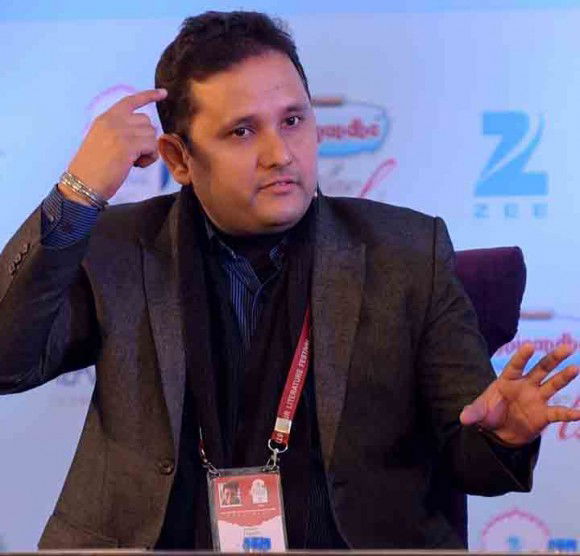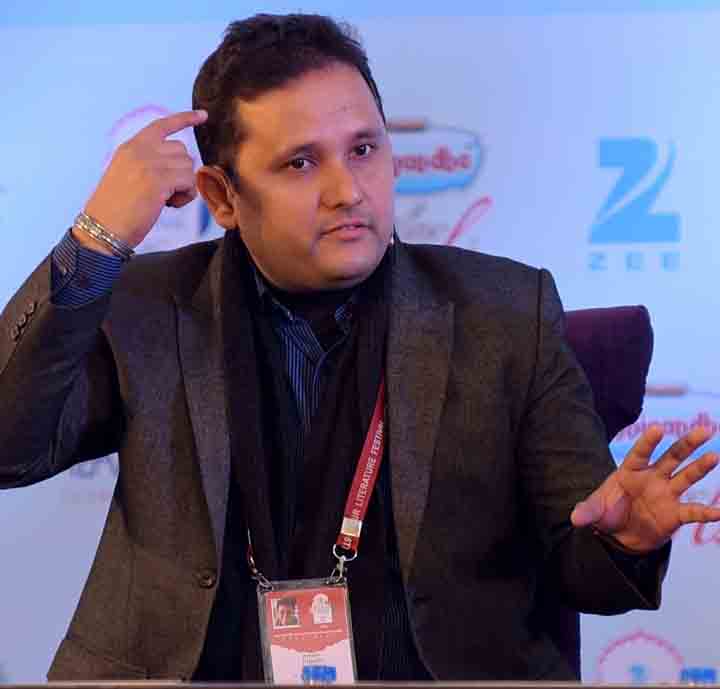Articles features
Caste system in ancient India wasn't rigid: Author Amish Tripathi

Kolkata, Jan 24
As India battles the widespread anger following a Dalit research scholar's suicide, best-selling author Amish Tripathi is trying to drive home the message that in ancient India the caste system was not rigid and was not attributed to one's birth.
Tripathi, who deftly weaves in threads on women's empowerment and the caste system in his interpretations of Indian mythologies, prefers to reserve his judgement on the Hyderabad University issue since it's under investigation.
But he concedes that oppression continues despite the progress the country has made in the last almost 70 years since independence.
Rohith Vemula's death on January 17 in Hyderabad University after being suspended for allegedly assaulting an ABVP leader has resulted in mass protests across India.
"As far as specific incidents are concerned, learning from the Delhi church attacks and Ranaghat nun rape case (In West Bengal), it turned out the incidents were not how they were portrayed; so we should stay calm and wait for investigation to conclude.
"At a broader level, there is no doubt oppression does take place. We have made improvements in the last 70 years but there is still a long way to go," Tripathi, who burst on to the scene in 2010 with the popular Shiva trilogy, told IANS in an interview here during the Tata Steel Kolkata Literary Meet.
The banker-turned-writer penned the hugely successful "The Immortals of Meluha", "The Secret of the Nagas" and "The Oath of the Vayuputras" novels of the Shiva trilogy. His latest "Scion of Ikshvaku" is the first book in the Ram Chandra series - his take on the Indian epic Ramayana. The second book is in progress and talks are on for movie adaptations.
"In my books, I actually speak about the caste system. If you see the genetic research that is coming out, it's very clear the caste system was not based on birth. In ancient times it was not rigid," the 41 year-old IIM-Calcutta alumnus contended.
As examples, he says Maharishi Valmiki who wrote the Valmiki Ramayana was not born a Brahmin.
"The Maharishi who composed the Mahabharata, who compiled the Vedas, was not born a Brahmin, he was born to a fisherwoman. He became a Brahmin... not just a Brahmin... he became a rishi (sage)," Tripathi underlined.
In addition to the textual proof, he also lays strong emphasis on current genetic research.
"Research shows till around 1,900 to 2,000 years ago, there was heavy intermingling in India between all groups. That's the first sign of caste system... there is no inter-marrying. Something happened between 1,500 to 2,000 years ago when the inter-marrying stopped. So some people assume that is when the caste system became rigid.
"In ancient times, most of the evidence points to the fact that the caste system was actually not rigid and that is what I am trying to bring out in my books. It was not based on birth. In the Bhagavad Gita, Lord Krishna clearly says: I created the four varnas based on 'guna' and 'karma' based on your attributes and on your karma, not on birth."
Ascribing his knowledge of mythology and scriptures to his family (his paternal grandfather was a pandit and taught at Banaras Hindu University, his maternal grandmother was also a teacher), Tripathi says his love for India doesn't mean he can turn a blind eye to issues that need to be dealt with.
"I am a deep patriot. I love my country but I also believe patriotism should not blind us to the things that need to be improved and of course one doesn't like to be told about our country by Westerners, most of them likely have no love for our country; they just want to come and judge us.
"There's a difference in the attitude of someone who deeply loves his or her own country and there are things which he feels needs to improve," Tripathi signed off.
(Sahana Ghosh can be contacted at sahana.g@ians.in)
Tripathi, who deftly weaves in threads on women's empowerment and the caste system in his interpretations of Indian mythologies, prefers to reserve his judgement on the Hyderabad University issue since it's under investigation.
But he concedes that oppression continues despite the progress the country has made in the last almost 70 years since independence.
Rohith Vemula's death on January 17 in Hyderabad University after being suspended for allegedly assaulting an ABVP leader has resulted in mass protests across India.
"As far as specific incidents are concerned, learning from the Delhi church attacks and Ranaghat nun rape case (In West Bengal), it turned out the incidents were not how they were portrayed; so we should stay calm and wait for investigation to conclude.
"At a broader level, there is no doubt oppression does take place. We have made improvements in the last 70 years but there is still a long way to go," Tripathi, who burst on to the scene in 2010 with the popular Shiva trilogy, told IANS in an interview here during the Tata Steel Kolkata Literary Meet.
The banker-turned-writer penned the hugely successful "The Immortals of Meluha", "The Secret of the Nagas" and "The Oath of the Vayuputras" novels of the Shiva trilogy. His latest "Scion of Ikshvaku" is the first book in the Ram Chandra series - his take on the Indian epic Ramayana. The second book is in progress and talks are on for movie adaptations.
"In my books, I actually speak about the caste system. If you see the genetic research that is coming out, it's very clear the caste system was not based on birth. In ancient times it was not rigid," the 41 year-old IIM-Calcutta alumnus contended.
As examples, he says Maharishi Valmiki who wrote the Valmiki Ramayana was not born a Brahmin.
"The Maharishi who composed the Mahabharata, who compiled the Vedas, was not born a Brahmin, he was born to a fisherwoman. He became a Brahmin... not just a Brahmin... he became a rishi (sage)," Tripathi underlined.
In addition to the textual proof, he also lays strong emphasis on current genetic research.
"Research shows till around 1,900 to 2,000 years ago, there was heavy intermingling in India between all groups. That's the first sign of caste system... there is no inter-marrying. Something happened between 1,500 to 2,000 years ago when the inter-marrying stopped. So some people assume that is when the caste system became rigid.
"In ancient times, most of the evidence points to the fact that the caste system was actually not rigid and that is what I am trying to bring out in my books. It was not based on birth. In the Bhagavad Gita, Lord Krishna clearly says: I created the four varnas based on 'guna' and 'karma' based on your attributes and on your karma, not on birth."
Ascribing his knowledge of mythology and scriptures to his family (his paternal grandfather was a pandit and taught at Banaras Hindu University, his maternal grandmother was also a teacher), Tripathi says his love for India doesn't mean he can turn a blind eye to issues that need to be dealt with.
"I am a deep patriot. I love my country but I also believe patriotism should not blind us to the things that need to be improved and of course one doesn't like to be told about our country by Westerners, most of them likely have no love for our country; they just want to come and judge us.
"There's a difference in the attitude of someone who deeply loves his or her own country and there are things which he feels needs to improve," Tripathi signed off.
(Sahana Ghosh can be contacted at sahana.g@ians.in)


3 hours ago
NAMAM organized vibrant and unforgettable festival, a true feast for the senses.

6 hours ago
'Go get me my phone': Hegseth recalls Trump's 'FAFO' moment after US strikes on Iran's nuclear sites

6 hours ago
Patna-born doctor Anjani Sinha takes charge as US Envoy to Singapore

8 hours ago
Trump endorses candidate for Governor of Ohio Ramaswamy

8 hours ago
Indian Consulate in Seattle hosts Pre-Event Briefing Session ahead of AI INDIA Impact Summit 2026

12 hours ago
Isha Koppikar says 'Miss you deeply, Aunty Zarine' as she remembers Sussanne Khan's mother

12 hours ago
Letting my bike Dyna go was one of the hardest losses of my life, says actor Gautham Karthik

12 hours ago
Arjun Rampal enchants with his menace avatar as the Angel of Death in 'Dhurandhar'

12 hours ago
Malaika Arora calls working on Yo Yo Honey Singh’s Chillgum 'an absolute blast'

12 hours ago
Vivek Agnihotri’s ‘The Bengal Files’ to premiere digitally on November 21

12 hours ago
Actor Arun Vijay’s 'Retta Thala' to hit screens on December 18

12 hours ago
India seeks equitable climate action at CoP30 summit in Brazil

12 hours ago
PM Modi to flag off Ernakulam–KSR Bengaluru Vande Bharat through video conferencing today






















